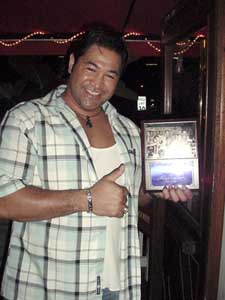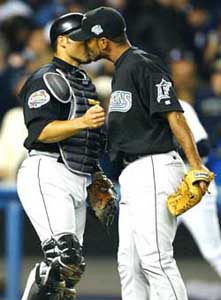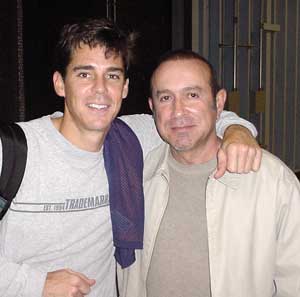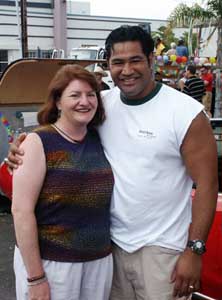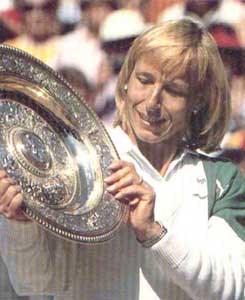health & sports
A year of ups and downs for gays in sports
A look back at 2003 in sports
Published Thursday, 01-Jan-2004 in issue 836
January
Father of Serbian tennis star Jelena Dokic said he would kill himself if his daughter “became a lesbian.”
In a tirade against lesbian tennis players, Damir Dokic said, “More than 40 per cent of women in world tennis are lesbians. I couldn’t stand it if Jelena turned out to be one of them. I’d kill myself.”
New York Jets’ defensive back Nick Ferguson got into the act when asked by Howard Stern if there were any gays on the Jets team Ferguson said emphatically, “None.”
Stern then asked how Ferguson would feel if there was a gay player on the team.
“Outside, I don’t care,” Ferguson said. “But I would let him go into the shower alone.”
Then Stern asked him if there were any gays on the Oakland Raiders.”
“It’s California,” Ferguson said laughing. “After all, [Oakland] is not far from San Francisco.”
February
Parents and Friends of Lesbians and Gays (PFLAG) unveiled the nation’s first-ever college scholarship for gay students named after former NFL defensive tackle Esera Tuaolo.
“I didn’t expect all or any of this, but the response in this country has been so supportive,” said Tuaolo, who came out in October of 2002. “It’s not about me anymore. It’s not about my family. It’s something bigger than I am. My story adds another dimension to the fight for gay rights.”
And at age 46, lesbian tennis super star Martina Navratilova was a Grand Slam champion again. Navratilova served out the match, teaming with India’s Leander Paes to beat Todd Woodbridge and Eleni Daniilidou 6-4, 7-5 for the Australian Open mixed doubles championship.
It was her first mixed title in the Australian, and completed an impressive cycle—at least one title each in singles, doubles and mixed doubles at all four major tournaments.
“This goes beyond any wildest dream,” said Navratilova, who was playing in her first Grand Slam final in almost eight years.
Former San Diego Padre Billy Bean and Esera Tuaolo came to America’s Finest City to take part in the annual Hillcrest Classic basketball tournament, sponsored by the San Diego Hoops basketball league.
“This is my first basketball tournament, and you know, call me naive, but before I came out I didn’t know what to expect and I didn’t know what the caliber of athletes would be, but man, I am giddy,” Tuaolo said in an interview. “This is great, there are great athletes and this is a great tournament, so I am having a blast.”
April
The first National Gay & Lesbian Athletics Conference was held in Boston to discuss issues related to gays in sports and homophobia.
“The conference will shake up the sports world, and not just in the LGBT community,” Mac Chinsomboon, executive director of the Gay and Lesbian Athletics Foundation, which put on the conference, said in a news release. “The impact on mainstream sports will be felt as stories are written by the media who were at the conference, including ESPN, ‘HBO Real Sports’ and Sports Illustrated, and by many others who have requested photos and transcripts.”
May
Billy Bean returned to San Diego with the release of his autobiography, Going the Other Way. Bean signed books before a crowded auditorium at The Center, and talked about his experience as a closeted baseball player.
“This book right now is an opportunity to make something of my career,” Bean said. “Maybe sort of make up for the fact that I didn’t achieve the level of success as a player that I dreamed up, but accidentally almost to make a bigger huge impact on the world and life and it’s much more fulfilling than a lifetime batting average of 300 or something.”
June
Take Me Out, a play about an openly gay baseball player, took home its fair share of Tony Awards in June. Daniel Sunjata earned a Best Performance by a Featured Actor in a Play nomination, but it was openly gay fellow cast member Denis O'Hare who won the award. Take Me Out also won for Best Play and Best Direction of a Play.
Colorado Rockies pitcher Todd Jones told The Denver Post that he would not want to have a gay teammate. The comments were part of an entertainment story about the Tony award winning play Take Me Out.
“I wouldn’t want a gay guy being around me,” Jones told the paper. “It’s got nothing to do with me being scared. That’s the problem: All these people say he’s got all these rights. Yeah, he’s got rights or whatever, but he shouldn’t walk around proud. It’s like he’s rubbing it in our face. ‘See me, hear me roar.’ We’re not trying to be close-minded, but then again, why be confrontational when you don’t really have to be?”
July
Esera Tuaolo, who spent nine seasons as a player in the National Football League, returned to San Diego as the Grand Marshall for the 2003 San Diego Pride Parade. “[Being out and attending Pride events] is a whole new world that I never thought I could be a part of. I was playing in the NFL and it’s such a macho environment. [Mitchell and I] were just living in a lie. We were jumping through hoops that society threw at us. We wanted our children to know that their fathers are proud of [themselves]. It’s so different when you have children. We found our voice in the eyes of our children,” Tuaolo explained.
August
The Philadelphia Phillies joined the growing list of Major League Baseball teams reaching out to gay fans with their “Gay Community Day” at Veterans Stadium. The City of Brotherly Love Softball League (CBLSL), National Lesbian and Gay Journalists Association (Philadelphia chapter), Gay and Lesbian Lawyers of Philadelphia, and the Gay and Lesbian Medical Association sponsored the event.
“The CBLSL is an ever-growing organization,” said Cliff Gibson of the CBLSL. “We are constantly looking to get more people, especially people in their early twenties involved. This kind of coverage could even mean getting to those people not yet out of the closet, but close enough that they can join our league and build that support net that makes coming out so much easier.”
September
Mike Freeman of The New York Times released his book Bloody Sundays, which chronicles the ins and outs of professional football from the front office to the locker room. Gay fans of the sport were abuzz over a chapter of the book dedicated to the story of “Steven Thompson” (a pseudonym), a closeted football player.
According to a review of the book in Sports Illustrated, Thompson says he once considered telling a teammate he was gay but reconsidered after hearing the teammate say about a gay couple: “Somebody should kill those fucking faggots.” He also talks about how he dates women to throw teammates off the scent.
Probably the most intriguing part of Thompson’s story is that he claims to have dated another pro footballer for a year and according to the SI review, that player reveals that he has dated four other guys in the league. Thompson goes on to say that he believes that there may be as many as 100-200 gay football players in the NFL.
November
Talks between the Federation of Gay Games (FGG) and the Montréal 2006 organizing committee failed resulting in the FGG pulling their license of the games to Montreal and the cancellation of the Montreal Gay Games 2006.
“November 10, 2003 will remain for me, and for thousands of gay and lesbian athletes around the world, a day of mourning,” said Tewksbury, an Olympic gold medalist, accusing the FGG of failing to bargain in good faith.
Montreal still plans to put on an international gay sporting event in 2006, without the Federation of Gay Games banner flying overhead. The Federation has begun a bidding process to select a new host for the next games however no date for the games has been set yet.
December
A rising star in the Cleveland Indians baseball organization appeared in a gay porn video. Kazuhito Tadano, a 23-year-old right-handed pitcher, was expected to sign with the Yokohama Bay Stars for over $2,000,000 in the Japanese draft when tabloids released a story exposing his involvement in the gay porn industry. Tadano, who says he is straight, told teammates that he appeared in the video as a 19-year-old freshman because he needed money.
Despite positive reactions from Tadono’s American teammates, nationally syndicated sports radio talk show host Jim Rome, on his website, said “We know what guys say with a microphone in front of him or a note pad. So we can only imagine what really is being discussed in clubhouses.
“A baseball clubhouse is one of the last bastions of bigotry and intolerance. That’s not going to fly. You wait and see what happens when he gets to the Majors. Not all of us have made gay porn and there are more Todd Jones’ and John Rockers than Mark Graces in big league clubhouses. More so than anyone wants to admit.”
Following the Kansas City Chiefs’ 45-17 victory over the Detroit Lions, the Lions general manager Matt Millen and Chiefs receiver Johnnie Morton ended up in an exchange of words that led to Millen using the one slur that is still acceptable in professional sports.
“You faggot! Yeah, you heard me. You faggot!” Millen yelled at Morton
Morton apologized for his part in the exchange, but was disappointed by Millen’s choice of words.
“What he said is demeaning and bigoted,” Morton told The Kansas City Star. “Jeremy Shockey got in trouble for saying it about a coach (Bill Parcells), and now we have a president of a team making statements like that. It’s totally unacceptable. I have gay friends, and I don’t even joke around with them like that.”
|
|
Copyright © 2003-2025 Uptown Publications

